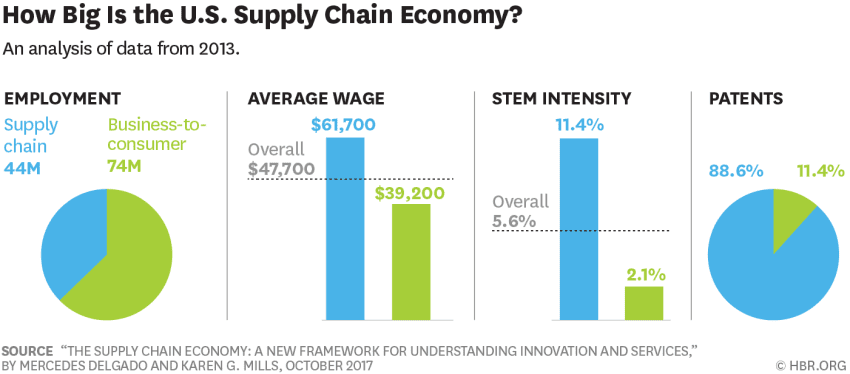Morgan Stanley Still Loves MBAs and the Feeling Is Mutual

Though interest in finance and accounting careers may be decreasing, gaining a job at an investment banks such as J.P. Morgan Chase, Goldman Sachs, and Morgan Stanley is still attractive for many MBA graduates. In 2018, a career in finance is the third most sought-after industry, according to a recent Graduate Management Admission Council (GMAC) study. Part of that reasoning is due to the high annual base salary ($115,000), which is this third highest, only behind general management ($125,000) and IT/MIS ($120,000).
So, what does it look like to work for a company such as Morgan Stanley as an MBA graduate? Is it your golden ticket to the future in 2018? We’re taking an inside look. Continue reading…
Forbes, Statista Analyze The Best U.S. Employers for Women

Forbes, in partnership with German data company Statista, surveyed over 40,000 U.S. employees (including 25,000 women) that worked for companies that had at least 1,000 total employees in an effort to find which companies were the best US employers for women. While several big-name companies earned high marks, one particular Iowa-based company managed to stand out among the competition.
The first set of criteria Forbes and Statista analyzed to calculate its best US employers for women ranking centered around factors such as working conditions, diversity, and “how likely they’d be to recommend their employer to others.” When accounting for the men in the survey, in contrast to the women that were asked the same set of questions, scores were adjusted if the differences if answers became apparent. For example, Statista would adjust scores if men in the survey said a company had a lot of diversity, but women said that the same company did not.
The following set of criteria used in the survey, specifically for the female respondents, focused on “on factors such as parental leave, discrimination, and pay equity,” as well as nominated companies outside of the one they happen to work for. “The final list ranks the 300 employers that both received the most recommendations and boast the most gender diverse boards and executive ranks,” Forbes says.

Des Moines, Iowa company Principal Financial Group was the best U.S. company for women, according to Statista data.
Principal Financial Group, based out of Des Moines, Iowa, earned the highest honors for the 2018 ranking, with an official score of 91.4. The company, ranked 210th overall on the Fortune 500 list, employs 9,978 U.S. workers, nearly 60 percent of which are women. Speaking with Forbes, Kerry Gumm, the Principal Capital Director of Human Resources Strategy, says, “It really does start with the culture of the organization.”
“You can have a holistic life if you’re part of this organization,” she adds. “I’ve not felt the need to compromise in any way.”
Principal Financial Group earned high recommendations because of its benefits, which include “flexible work schedules, prenatal care programs, and an onsite childcare center.” The company also manages an annual review of all of its pay practices to better combat any potential biases, alongside an anonymous call center to help discuss compensation disputes. Not to be outdone, the company also implements rigorous standards in helping its own employees earn promotions, of which include “three women’s networks for those in leadership, technology, and sales roles.” In contrast to many of the companies listed in the aforementioned Fortune 500 listing, 42 percent of executive roles and 45 percent of the boards seats are held by women Principal Capital Group.
The University of Pennsylvania Health System, more commonly referred to as Penn Medicine, earned the number two spot on the ranking. The organization has over 35,000 U.S. employees; the third highest among the top ten ranked companies. With a significantly larger employee base than Principal Financial, Penn Medicine also has one of the largest percentages of female employees in the country at 77 percent. This also includes 55 percent women in the organization’s executive roles, as well as five out of its seven CEOs.
Card manufacturer Hallmark, based in Kansas City, Missouri, rounded out the top three. The company sports the smallest employee base out of any company in the top 10, with 2,500 U.S. employees. However, Hallmark featured an even larger portion of U.S. female employees than Penn Medicine, with a figure of 83 percent overall. About 70 percent of the Hallmark board is also held by women.
Several of the nation’s most prominent universities also managed to land in the top 50 of the new ranking, the highest of which was Harvard University at 9th overall. New York University, UVA, Stanford, and Emory University also earned high honors in the 2018 best US employers for women ranking.
2018 Best US Employers for Women
| Ranking | Company | # of U.S. Employees |
|---|---|---|
| 1 | Principal Financial Group | 9,978 |
| 2 | Penn Medicine | 35,273 |
| 3 | Hallmark | 2,500 |
| 4 | BayCare | 25,600 |
| 5 | Oregon Health & Science University | 15,642 |
| 6 | Keller Williams Realty | 154,000 |
| 7 | Boston Children's Hospital | 5,001 |
| 8 | Providence Health & Services | 82,000 |
| 9 | Harvard University | 18,724 |
| 10 | Gwinnett County Public Schools | 23,300 |
Click here to see the 2018 entire ranking.
10 Highest GPA Averages in the Business School World

The role of a GPA in MBA admissions is a hotly debated topic among both admissions officers and applicants. How much does it really matter? Does a low GPA destroy your chances of getting into a top business school?
One of the most important things to keep in mind when considering how your undergraduate GPA will impact the MBA admissions process is the fact that not all GPAs are alike. Far from a standardized figure, GPA and the way it’s measured can vary from school to school- even major to major. For this reason, it can be difficult to use the GPA’s of different applicants as any accurate predictor of success.
An student’s GPA will always be an important part of the admissions process, because it helps tell admissions officers about past academic success. Still, admissions officers are well aware of the high level of variability between GPA scores. Taking this into account, most officers working in MBA admissions will always look for more to an individual’s story than just the GPA. Numbers like a GMAT/GRE can often paint a much more exact picture of future academic success than the highly variable GPA. Designed for standardization and to test individuals on the specific challenges of an MBA, a GMAT score allows admissions officials specific insight into each application.
When considering GPA, a general rule of thumb is to not ride or die by this number—whether for better or for worse. A low undergraduate GPA doesn’t necessarily spell disaster for one’s MBA ambitions, and even a perfect 4.0 can’t save an application if the other factors don’t add up.
Overall, the exact number of an undergraduate GPA may be less important than the story behind it. If your low GPA was a result of illness or another external factor while in school, personal statements on the application are a great opportunity to give context behind the numbers and help tell your story to admissions officials.
YOU MAY ALSO LIKE: The Highest Paying MBA Internships You Can Find
Nevertheless, getting a sense of the average undergraduate GPA for your prospective programs can help give provide crucial insights. Class profiles and statistics for business schools throughout the country can give prospective students a good sense of the typical student looks like in each program, and help applicants decide if they’ll be a good fit.
Below, we take a look at the top 10 MBA programs with the highest average undergrad GPA. Take a closer look at these top schools to get an idea of the average student in each program- and your potential future classmates.
10 Highest GPA Averages for MBAs
1. Stanford University Graduate School of Business
The highest GPA average for MBA students in the U.S. belongs to the class at the Stanford University Graduate School of Business. For the Class of 2019, the average undergrad GPA was 3.74. This is down slightly from the school’s 2015 average of 3.75.
2. Harvard Business School
Often jockeying for position with Stanford, HBS took the number two spot this year with an average undergrad GPA score of 3.71. Three years ago, HBS still loomed large with a 3.66 average, and it just keeps getting higher.
3. Haas School of Business – UC Berkeley
Staying on the heels of Harvard, the Haas School of Business at UC Berkeley takes a top spot today with an undergraduate GPA of 3.7. This is a slight increase from the school’s 2015 average of 3.66.

The Haas School of Business GPA average for MBA applicants rose from 3.66 to 3.7 since 2015.
4. Yale School of Management
Significantly up from its GPA average of 3.6 in 2015, the Yale School of Management today has one of the highest undergraduate GPAs in the country at an average of 3.69.
5. Booth School of Business – University of Chicago
The MBA at University of Chicago’s Booth School of Business has consistently maintained one of the top GPA averages for programs in the U.S., up from 3.59 in 2015 to 3.6 this year.
6. The Wharton School – University of Pennsylvania
The Wharton School, consistently recognized for having some of the country’s top business programs, is nothing if not consistent. With a 3.6 average for incoming students between 2012 and 2015, Wharton maintains a perfect 3.6 average GPA this year as well.
7. Kellogg School of Management – Northwestern University
Northwestern’s Kellogg School of Management is another school where consistency is key. From 2014 to today the school has remained at an undergraduate GPA average of 3.6

The average Kellogg undergraduate GPA for MBA students has stayed at 3.6 since 2014.
8. Tuck School of Business – Dartmouth College
The average GPA for incoming students at Dartmouth’s Tuck School of Business has gone up and down throughout the years, but has consistently stayed among the highest in the country- down slightly from 3.52 in 2015 to 3.51 this year.
9. Columbia University – Columbia Business School
The Columbia Business School has always received distinctions as one of the top MBA programs in the country, and their average GPA for incoming students at 3.5—which has stayed the same for more than five years—is no exception.
10. MIT – Sloan School of Management
Typically placing much higher on the list, the average Sloan School of Management at MIT has decreased in recent years, from 3.54 in 2015 to 3.49 for this year’s incoming class. The number nonetheless still remains among the highest average GPAs for MBA programs throughout the country.
BREAKING: Temple Fox Business Dean Moshe Porat Resigns

Months after U.S. News & World Report officially removed the Temple University Fox School of Business from its annual rankings, dean Moshe Porat has been officially asked to step down from his role.
What are the Best MBA Programs by Specialty?

Each year, U.S. News and World Report looks at the top business schools around the country to decide which offer the best MBA programs. The goal is to help MBA candidates most effectively choose the best MBA degree to help them achieve their goals based on their interests and strengths. The problem is that there are hundreds of programs and it can be difficult to weed out all the noise to get to the information that you want most.
That’s why the U.S. News and World Report decided to break down all of their findings into a more easily consumable ranking. They outlined the top MBA programs by discipline to help you quickly and easily find the school you’re looking for. Each of the schools on the list was chosen based on alumni interviews, schools statistics, research data, and more.
We’ve broken down the results below along with crucial information about each school listed and where you can learn more information.
MIT Explores Happiness, and More – Boston News

Let’s explore some of the most interesting stories that have emerged from Boston business schools this week.
Probing the Origins of Happiness – MIT Newsroom
On the #InternationalDayofHappiness, Kara Baskin at the MIT Sloan School of Management explored the new book “The Origins of Happiness: The Science of Well-Being over the Life Course,” which was co-authored by MIT Sloan Ph.D. student George Ward. Talking about his work, Ward explains how global governments have been attempting to tap into the data of happiness in hopes of shaping future policies.
“We wanted to bring together this body of work in a systematic, quantitative way,” he explains. “Often, these are single studies that say ‘x’ is important for happiness; ‘y’ is important for happiness. In this book we try to provide an overarching framework that documents what makes for a satisfying life.”
“On the policy side,” he continues, “more and more countries are using well-being data in the real world. As we speak to policymakers, they often ask the question: ‘Look, we’re measuring this now and we have the impetus to improve these figures, move up these tables of happiness, and make our citizens enjoy their lives more. What can we do?'”
You can read the rest of the Ward interview here, and grab a copy of “The Origins of Happiness: The Science of Well-Being over the Life Course” today.
The Supply Chain Economy and the Future of Good Jobs in America – Harvard Business Review
The Harvard Business Review recently published an article from Mercedes Delgado and Karen Mills that outlines the increased role service suppliers will play in what some have dubbed the “supply chain economy.” Supply chain industries are simply “businesses that manufacture parts to be used in a final good,” like plastic injection molders and metal stampers.

These industries “have a crucial role in driving innovation and creating well-paying jobs,” in part because they “have downstream linkages to multiple industries, which allows the innovations they create to cascade and diffuse across the economy, potentially increasing the value of those innovations.”
Read more about HBS’ policy suggestions to emphasize “suppliers’ access to skilled labor, buyers, and capital” here.
BU Grad Schools Among Nation’s Best – BU Today
Several schools in the Boston metro saw a nice rankings boost in the recently release U.S. News & World Report Best Business Schools 2019 list, with the Questrom School of Business at Boston University leaping up two spots overall from last year, up to 42nd overall. The school’s part-time program also finished 10 spots better than last year, coming in 32nd overall.
In a release, Kenneth Freeman, Allen Questrom Professor and Dean in Management, said, “Rankings are inherently imperfect, but we appreciate the acknowledgement of the quality and reputation of our students, program, and alumni. Each year, we adjust our curricular content in response to student needs and our increasingly engaged corporate partners to create experiential opportunities to bridge the classroom and industry.”
You can catch up on the rest of BU’s graduate schools in the new ranking here.
